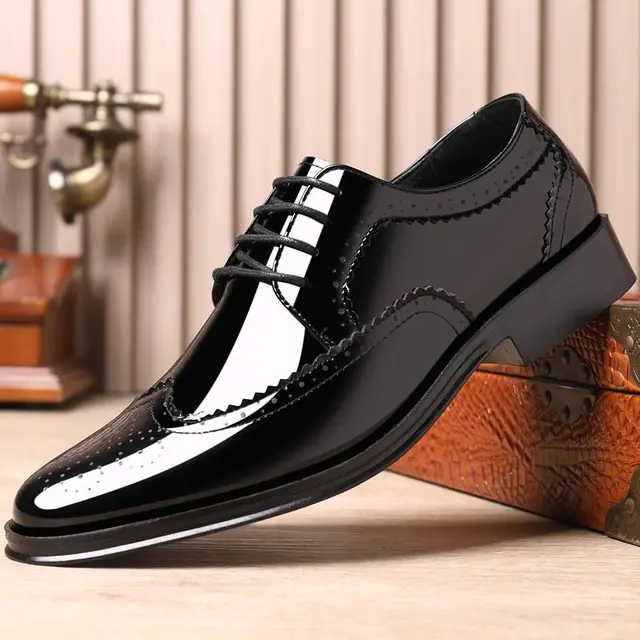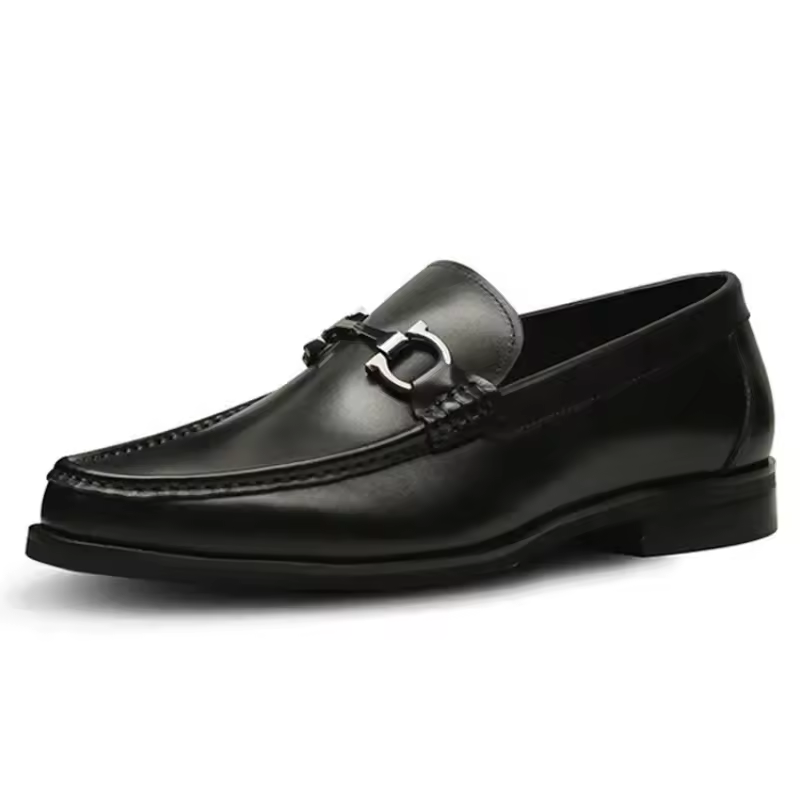The Appeal of Custom Leather Shoes
The allure of custom leather shoes lies in their uniqueness. They set you apart from the crowd. Every pair tells a story of personal style and individuality. Unlike off-the-shelf shoes, custom-made pairs offer a perfect fit, tailored to your foot’s contours. They are a luxury that speaks volumes about attention to detail and self-expression.
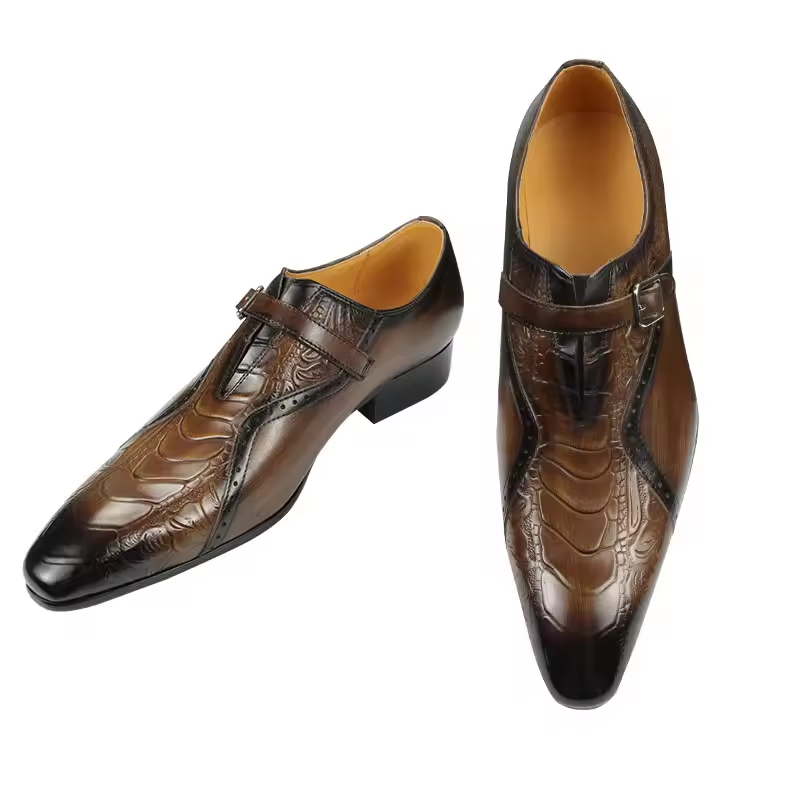
Custom leather shoes adapt to your feet over time, unlike mass-produced ones. They become more comfortable with each wear. Moreover, the quality of materials and craftsmanship ensures longevity. These shoes are a sustainable choice for fashion lovers.
Having custom leather shoes also means you have control over every aspect. From leather type to design and finish, every detail reflects your taste. Personalized details, like monograms, elevate the exclusivity of your footwear.
In essence, custom leather shoes are not just a purchase; they are an investment in your personal brand. They enhance your wardrobe’s versatility, complementing both casual and formal attire. Your shoes become a signature part of your style, showcasing a blend of tradition and your personal fashion sense. It’s an unmatched feeling of luxury and comfort, distinctly tailored to you.
Steps to Designing Your Perfect Leather Shoes
Creating custom leather shoes is a journey that begins with your vision. Here’s how to get started:
- Visualize Your Ideal Pair: Imagine the style that best represents you. Think about the occasions you’ll wear them to and what impressions you want to make.
- Select a Silhouette: Choose a basic shape that complements your personal style. Options range from classic oxfords to relaxed loafers and bold boots.
- Pick the Leather: Decide on the type of leather. Consider durability, comfort, and aesthetics. Options include full-grain, suede, and exotic leathers.
- Determine the Details: Specify elements like the color, type of soles, and unique embellishments. Personal touches make your shoes truly one-of-a-kind.
- Get Measured: Visit a skilled shoemaker to have your feet measured accurately. Custom leather shoes should fit like a glove.
- Review the Design: Go over the design with your shoemaker. Make sure every detail aligns with your expectations before the crafting begins.
These steps are a roadmap to achieving a pair of custom leather shoes that feel as good as they look. Remember to keep comfort, style, and personal preference in mind throughout each step. Your perfect pair awaits!
Traditional Craftsmanship Meets Modern Style
Crafting custom leather shoes involves a blend of old-world skill and contemporary fashion. Traditional techniques are essential to the quality and durability of your footwear. Artisans with years of experience handcraft each shoe. They use methods passed down through generations. These techniques ensure the highest quality of stitching, fitting, and finishing.
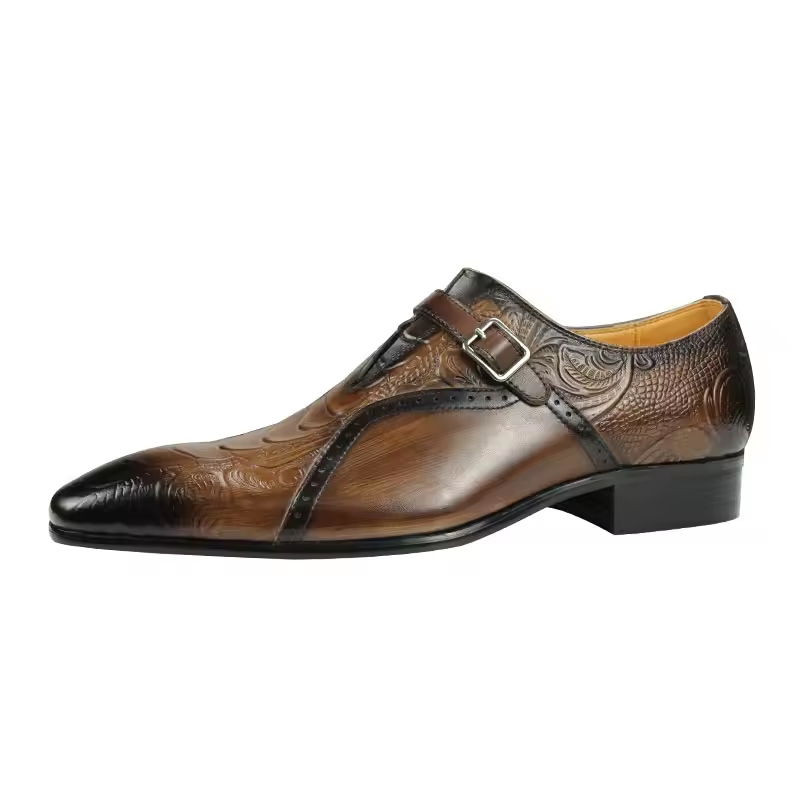
Custom leather shoes also embrace modern trends. You select designs that express your current style. Your choices reflect your fashion-forward thinking. You may choose minimalist designs or ones with intricate patterns. Modern customizations include different textures, colors, and tech-savvy features. For instance, some shoes now integrate smart tracking devices.
In this fusion of tradition and innovation, every pair of custom leather shoes is unique. They match the wearer’s personal taste with the timeless art of shoemaking. The result is a footwear statement that stands out in both style and quality. It is the perfect blend for the discerning individual who values heritage and modernity.
Choosing the Right Materials for Your Custom Shoes
Selecting the right materials is vital for your custom leather shoes. Your choice influences comfort, appearance, and durability. First, consider the leather type. Full-grain leather is durable and ages well. It’s a top pick for everyday wear. Suede offers a softer texture and casual look but requires careful maintenance. Exotic leathers, like snakeskin, make a bold statement and are remarkably distinct.
Next, think about the soles. Leather soles are traditional and elegant, ideal for formal shoes. Rubber soles offer more grip and are great for casual styles. For added comfort, consider cushioned insoles or orthopedic options.
Color is another important choice. Neutrals like black and brown are versatile and timeless. Bright colors or unique patterns personalize your shoes further. They let you showcase your style.
Also review lining materials. Leather linings breathe well, while fabric linings offer a different comfort level.
Evaluate every material in light of your lifestyle and style preferences. Your choices should reflect your personality and suit your needs. Quality materials ensure your custom leather shoes are both stylish and long-lasting. Engage with your shoemaker to select the best materials for your dream pair of shoes.
The Customization Process: What to Expect
Embarking on the journey of custom leather shoes is exciting, but what exactly should you expect during the customization process? Understanding the steps can help you relish the experience and ensure the final product is exactly what you envisioned.
Personal Consultation: Your first encounter will be a personal consultation. Here, you’ll discuss your needs, style preferences, and get advice from the expert. This is the time to bring your ideas to the table.
Material Selection: Next, is the fun of picking out the materials. You’ll choose leather types, colors, and textures that align with your style and functional needs. Skilled shoemakers may have samples for you to feel and compare.
Design Finalization: After materials are selected, you’ll finalize the design. This includes detailing the toe shape, heel height, and any special features, like monograms, that personalize your shoes further.
Fitting and Measurements: Precision is key in custom shoes. Your feet will be measured in multiple dimensions to ensure a perfect fit. This could be done using traditional tools or digital scanning technologies.
Crafting the Shoes: Crafting begins once everything is measured and approved. You won’t be involved in this step, but rest assured, your shoemaker will be employing both traditional craftsmanship and modern techniques to build your shoes.
Final Fitting and Adjustments: When the shoes are ready, a final fitting ensures they fit perfectly. Minor adjustments can be made if necessary to guarantee comfort and style.
Delivery: Finally, your custom leather shoes are polished, packed, and delivered to you – ready to elevate your wardrobe and reflect your personal flair.
Each step is taken with care to provide a result that’s distinctly ‘you’. The process of creating custom leather shoes is indeed a personal and meticulous one, filled with choices that reflect your individual style.
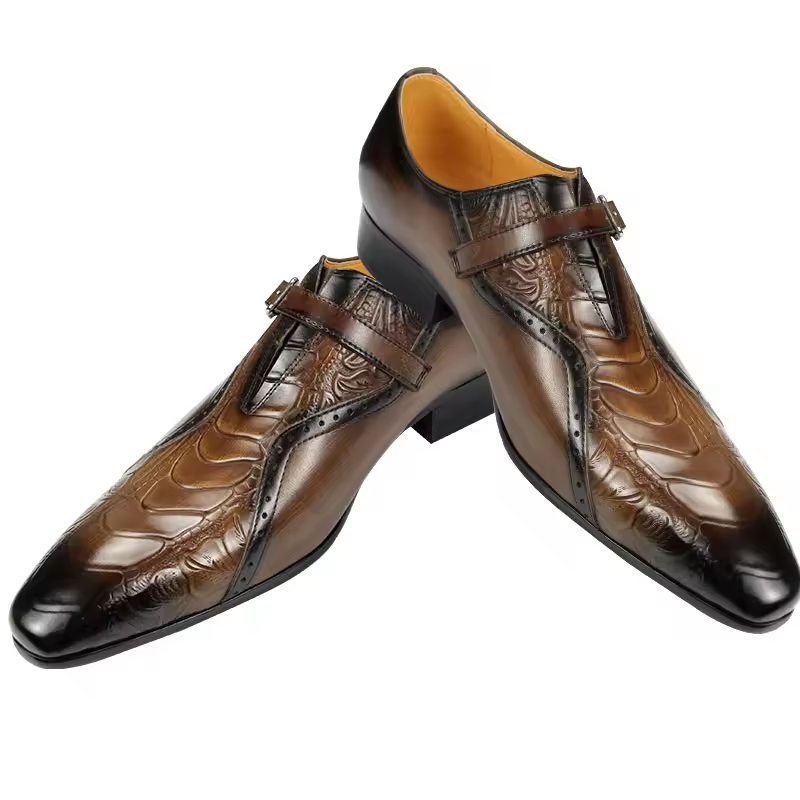
Caring for Your Personalized Leather Shoes
Once you have your custom leather shoes, proper care is key to longevity. Here are steps to keep them in top shape:
- Clean Regularly: Wipe away dirt and dust with a soft cloth after each wear.
- Condition Often: Apply leather conditioner to prevent cracks and keep the leather supple.
- Polish for Shine: Use a good quality polish to maintain the luster and protect the surface.
- Avoid Water Damage: Protect your shoes from rain and spills with a waterproof spray. If they get wet, let them dry naturally away from heat sources.
- Store Correctly: Keep your shoes with shoe trees inside to hold their shape. Store them in a breathable bag or box, away from direct sunlight.
- Rotate Use: Don’t wear the same pair every day. Give them time to air out between wears.
- See a Professional: For any major concerns, like deep scuffs or structural damage, consult a professional cobbler.
Remember, investing time in caring for your custom leather shoes pays off. They will serve you well and retain their class for years to come. Keep these tips in mind to preserve the craftsmanship and personal touches that make your shoes unique.
The Investment: Cost and Value of Custom Leather Footwear
When considering custom leather shoes, think about the cost versus value. Custom shoes are an investment. They last longer than regular shoes and fit better. The process of making them involves skilled workmanship. This adds to the cost but also to the quality. Prices can vary, depending on the materials and the maker’s reputation. Despite the higher upfront cost, the value is in the durability and personalized fit. Custom shoes can also save money over time. You may not need to replace them as often as regular shoes. They can become a staple in your wardrobe, matching different outfits for various occasions. The value lies not just in the product, but in the experience. Designing your own shoes is a special process. It gives you shoes that truly reflect your style. The cost includes this personalized service. In the end, your footwear becomes more than just shoes; they are a statement of your personal brand.
Finding a Reputable Custom Leather Shoe Maker
Finding a good craftsman is key when looking to buy custom leather shoes. Here are some steps to ensure you select a reputable shoemaker:
- Research Thoroughly: Start with an online search for custom shoe makers in your area. Read reviews and check their portfolios to gauge their style and quality.
- Ask for Recommendations: Talk to friends or family who own custom shoes. They can point you to trusted artisans.
- Check Experience: Look for a shoemaker with years of experience. Skilled artisans have honed their craft over time.
- Visit Workshops: If possible, visit the shoemakers’ workshops. This gives a glimpse into their work environment and craftsmanship.
- Interview Them: Ask the shoemaker about their process, materials, and design options. It shows their knowledge and commitment.
- Evaluate Communication: A good shoemaker listens to your needs and communicates clearly.
- Look at Past Work: Examine their previous work. Look for clean stitching, quality materials, and attention to detail.
- Understand Guarantees: A reputable shoemaker stands behind their work. They should offer repair or adjustment services if needed.
- Discuss Timelines: Understand how long the process will take. A good craftsman is often busy, but should manage time efficiently.
- Mind the Cost: Quality comes at a price. Be wary of prices that seem too low, as they may reflect poor quality.
Your custom leather shoes are an investment. Take the time to find a shoemaker who will deliver the quality and style you expect.
